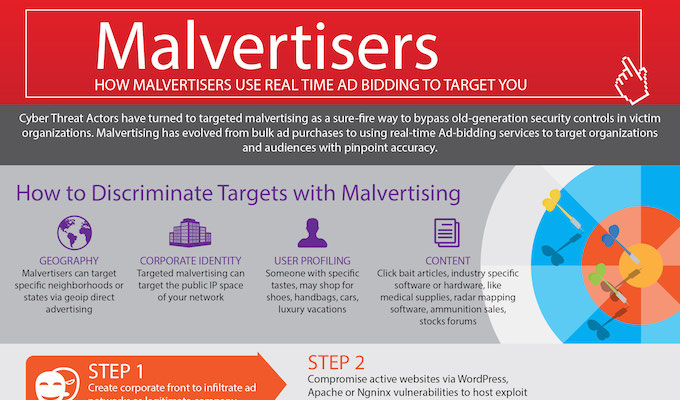by Brian Donohue/ Posted on 10/17/2014
Advanced persistent threat groups are using malvertising in order to compromise the networks of their adversaries in what appears to be an example of high-level, nation-state attackers borrowing tactics from the typically less sophisticated cybercriminal arsenals. Attackers are also borrowing from the corporate marketing world by leveraging a form of high-speed advertisement placement known as “real-time ad-bidding.” In a report made public today, the Virginia-based security firm Invincea says it has discovered a state-sponsored APT campaign, dubbed “Operation DeathClick.” They claim that they blocked the attacks and were therefore not able to determine much in the way of attribution, but the attack itself is novel in the way it deployed a new and aggressive form of malvertising. Invincea claims this isn’t your standard, criminal variety of malvertising. Traditional malvertising is indiscriminate. Criminals compromise an online advertising network and use the network’s ads to redirect as many users as possible to third party sites containing exploit kits and malware. In certain greyer cases the ad networks act unscrupulously themselves.
Full Article
Malicious advertisements are being 'micro-targeted' at defence companies, Invincea said
Jeremy Kirk, IDG News Service - 20 October 2014
A major change this year in how online advertisements are sold has been embraced by hackers, who are using advanced ad-targeting capabilities to precisely deliver malware.
Security vendor Invincea said it has detected many instances of people within defence and aerospace companies stumbling across malicious advertisements that are shown only to them, a scheme it calls “Operation DeathClick.” A white paper on the scheme will be released Friday.
The cybercriminals are taking advantage of a sea change in the online advertising industry, which has mostly stopped selling “bulk” user impressions and moved to real-time bidding for advertisements that are highly targeted, said Patrick Belcher, director of malware analysis at Invincea, in a webinar presentation Thursday.
Full Article
Jeremy Kirk, IDG News Service - 20 October 2014
A major change this year in how online advertisements are sold has been embraced by hackers, who are using advanced ad-targeting capabilities to precisely deliver malware.
Security vendor Invincea said it has detected many instances of people within defence and aerospace companies stumbling across malicious advertisements that are shown only to them, a scheme it calls “Operation DeathClick.” A white paper on the scheme will be released Friday.
The cybercriminals are taking advantage of a sea change in the online advertising industry, which has mostly stopped selling “bulk” user impressions and moved to real-time bidding for advertisements that are highly targeted, said Patrick Belcher, director of malware analysis at Invincea, in a webinar presentation Thursday.
Full Article
Reply
Login to the community
No account yet? Create an account
Enter your username or e-mail address. We'll send you an e-mail with instructions to reset your password.





